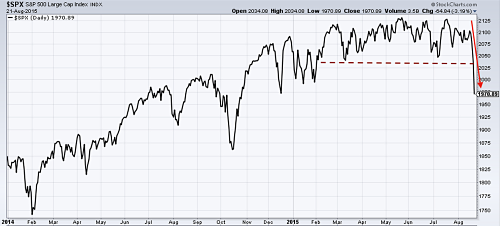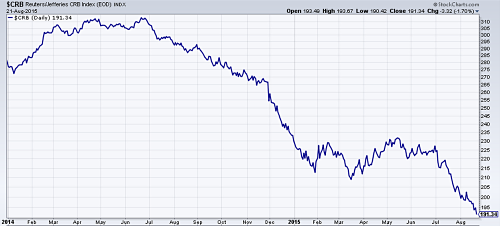China’s stock market crash continued last week as the country devalued its currency. Although US equities were showing resilience against global economic weakness, last week the picture changed completely.
The last sell-off in Chinese shares, worries about bearish commodities markets with crude oil at $40/barrel and a dash of Federal Reserve rate-hike fear, made US equity investors throw in the towel last Friday.

S&P 500 falling sharply breaking support.
US stocks suffered their worst losses in four years and the technical picture looks at least worrisome. All major indexes fell in heavy volume, breaking a key support level that was established this year.
Correction?
Some people might argue that the market is in a normal correction and, therefore, Friday left a good opportunity to buy a dip. Although that could be the case, we believe this could be the first leg of a further decline in US shares.
When a market refuses to rally from a sharp decline like the one we had Thursday and Friday, it’s a sign that institutions are selling big blocks of stock. This is also happening after the general market had an extended advance (the stock market barely had a correction since 2012) and now the amount of supply (all the people and funds that are holding stocks) can overwhelm the indexes as investors flee stocks to lock in profits.
Indeed, in the black Monday of 1987, the market had a similar advance prior to the crash. The chances of a similar crash are not high, but you get the point.
All this is just making investors to keep a closer eye on China and a growing concern about China’s economy is pushing commodities down.

CRB commodities index in free fall (2014-today). Graph: MetalMiner analysis of @stockcharts.com data.
The CRB commodity index keeps making new lows. Now both the US stock market and commodities markets seem to be linked and sharing a common driver: China.
What Does This Mean For Commodity Buyers?
Now that all eyes are on China, both commodities and US shares might start moving together, and the plunge might stop once the sentiment on China changes. When will that be? Nobody knows, but it doesn’t look like we are there yet…
